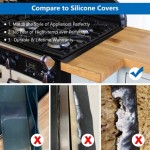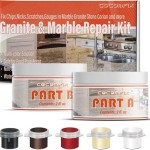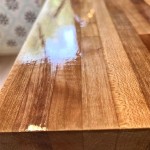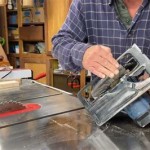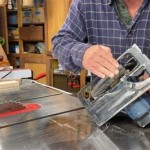How To Clean A Countertop
Countertops are a fundamental component of any kitchen and bathroom, serving as work surfaces and focal points within the space. Regular cleaning is crucial not only for maintaining their aesthetic appeal but also for ensuring a hygienic environment, preventing the spread of germs and bacteria. The appropriate cleaning method depends heavily on the material of the countertop itself, as different surfaces react differently to various cleaning agents. This article provides a comprehensive guide on how to effectively clean countertops made from various common materials.
Identifying Countertop Material
Before embarking on the cleaning process, accurate identification of the countertop material is paramount. Misidentifying the material can lead to the use of inappropriate cleaning products, potentially causing irreversible damage, discoloration, or etching. Common countertop materials include granite, marble, quartz, laminate, solid surface (such as Corian), wood, and stainless steel. Each material possesses unique characteristics and requires specific cleaning protocols.
Granite countertops are known for their durability and resistance to heat, but they are porous and susceptible to staining from oil, grease, and acidic substances. Marble is a softer, more porous stone than granite and is particularly vulnerable to etching from acidic cleaners. Quartz countertops, engineered from quartz crystals and resin, are non-porous and highly resistant to stains and scratches. Laminate countertops are typically constructed from layers of plastic bonded to particleboard, making them relatively inexpensive but also prone to damage from heat and moisture. Solid surface countertops are non-porous and seamless, offering excellent resistance to stains and bacteria. Wood countertops, often made of butcher block, require regular sealing to prevent water damage and bacterial growth. Stainless steel countertops are hygienic and easy to clean but can be prone to scratches and fingerprints.
If uncertain about the countertop material, consult the original installation paperwork or contact the manufacturer or installer for clarification. This information is vital for selecting the correct cleaning methods and products.
General Cleaning Supplies
Regardless of the countertop material, certain cleaning supplies are universally useful for maintaining a clean surface. These include:
*Soft Microfiber Cloths:
Microfiber cloths are highly absorbent and non-abrasive, making them ideal for wiping down countertops without scratching or damaging the surface. It is advisable to use separate cloths for different tasks, such as cleaning and drying, to prevent cross-contamination. *Warm Water:
Warm water is an effective cleaning agent on its own for removing light dirt and grime. It is also a necessary component for diluting cleaning solutions. *Mild Dish Soap:
A few drops of mild dish soap mixed with warm water create a gentle cleaning solution suitable for most countertop materials. Ensure the dish soap does not contain harsh chemicals or abrasive additives. *Spray Bottle:
A spray bottle facilitates the even distribution of cleaning solutions across the countertop surface. *Soft-Bristled Brush (Optional):
A soft-bristled brush can be helpful for scrubbing stubborn stains or dirt in crevices, but it is crucial to use it gently to avoid scratching the surface. This is more useful on materials like quartz and stainless steel, and should be avoided on marble.It is essential to avoid using abrasive cleaners, scouring pads, or harsh chemicals, such as bleach, ammonia, or acidic cleaners, on countertops unless specifically recommended by the manufacturer. These substances can cause irreversible damage to many countertop materials.
Specific Cleaning Procedures for Different Countertop Materials
Following a general cleaning procedure, detailed below, provides the groundwork for any countertop surface. However, it is vital to specifically tailor cleaning methods to the material to enhance longevity and appearance. The following are material-specific guides:
Granite:
Granite countertops require a pH-neutral cleaner to prevent damage to the sealant. Avoid acidic cleaners like vinegar or lemon juice. Clean granite countertops daily with a soft microfiber cloth and a pH-neutral cleaner or a solution of mild dish soap and warm water. Spray the cleaning solution onto the countertop, wipe it down with the cloth, and then dry the surface with a clean, dry cloth. For stubborn stains, create a paste of baking soda and water, apply it to the stain, and let it sit for 15-30 minutes before wiping it away. Reseal granite countertops annually or as recommended by the manufacturer.
Marble:
Marble is a delicate material that requires gentle cleaning. Avoid all acidic cleaners, including vinegar, lemon juice, and ammonia. Clean marble countertops daily with a soft microfiber cloth and a pH-neutral cleaner specifically designed for marble. Wipe up spills immediately to prevent staining. For stubborn stains, consider using a poultice made from baking soda and water or purchasing a commercially available marble stain remover. Marble countertops should be sealed regularly to protect against staining and etching. Professional cleaning may be required for deeply embedded stains or etching.
Quartz:
Quartz countertops are relatively easy to clean due to their non-porous nature. Clean quartz countertops daily with a soft microfiber cloth and a mild dish soap and warm water solution. For stubborn stains, use a non-abrasive cleaner or a quartz cleaner specifically designed for quartz. Avoid using abrasive cleaners or scouring pads, as these can dull the surface. Dried food or spills can be gently scraped off with a plastic putty knife. Quartz countertops do not require sealing.
Laminate:
Laminate countertops are susceptible to damage from heat and moisture. Clean laminate countertops daily with a soft microfiber cloth and a mild dish soap and warm water solution. Avoid using abrasive cleaners or scouring pads, as these can scratch the surface. Wipe up spills immediately to prevent water damage. For stubborn stains, use a laminate cleaner or a paste of baking soda and water. Avoid placing hot pots or pans directly on laminate countertops, as this can cause blistering or warping. Use cutting boards to protect the surface from scratches.
Solid Surface (Corian):
Solid surface countertops are non-porous and resistant to stains and bacteria. Clean solid surface countertops daily with a soft microfiber cloth and a mild dish soap and warm water solution. For stubborn stains, use a non-abrasive cleaner or a solid surface cleaner specifically designed for solid surface. Light scratches can often be removed with a mild abrasive cleanser and a damp sponge. More severe scratches may require professional repair. Avoid placing hot pots or pans directly on solid surface countertops, as this can cause damage.
Wood (Butcher Block):
Wood countertops require regular sealing to prevent water damage and bacterial growth. Clean wood countertops daily with a soft microfiber cloth and a mild dish soap and warm water solution. Avoid using abrasive cleaners or scouring pads. Dry the surface thoroughly after cleaning to prevent water damage. Sanitize wood countertops with a solution of white vinegar and water (1:1 ratio). Re-oil or re-seal wood countertops regularly with a food-safe oil or sealant designed for butcher block.
Stainless Steel:
Stainless steel countertops are hygienic and easy to clean. Clean stainless steel countertops daily with a soft microfiber cloth and a mild dish soap and warm water solution. Wipe the surface in the direction of the grain to prevent streaks. For stubborn stains or fingerprints, use a stainless steel cleaner. Avoid using abrasive cleaners or scouring pads, as these can scratch the surface. To remove water spots, use a solution of white vinegar and water (1:1 ratio). Dry the surface thoroughly after cleaning to prevent water spots.
General Cleaning Procedure
The general cleaning procedure detailed here applies to most countertop materials, and can be adapted as needed to fit the specifics of the surface. It provides a framework for keeping countertops clean and hygienic on a daily basis.
1.
Clear the Countertop:
Remove all items from the countertop, including appliances, dishes, and decorative objects. This will provide unobstructed access to the entire surface and prevent cleaning solutions from damaging these items.2.
Remove Loose Debris:
Use a soft cloth or brush to sweep away any loose crumbs, dust, or debris from the countertop surface. This will prevent these particles from scratching the surface during the cleaning process.3.
Prepare Cleaning Solution:
Prepare a cleaning solution by mixing a few drops of mild dish soap with warm water in a spray bottle or bucket. Ensure the dish soap is free of harsh chemicals or abrasive additives. Alternatively, use a commercially available countertop cleaner that is specifically designed for the material of the countertop.4.
Apply Cleaning Solution:
Spray the cleaning solution evenly onto the countertop surface. Avoid oversaturating the surface, as excess moisture can damage some countertop materials. For areas with stubborn stains or dirt, allow the cleaning solution to sit for a few minutes to loosen the debris.5.
Wipe Down the Countertop:
Use a soft microfiber cloth to wipe down the countertop surface, applying gentle pressure to remove any dirt or stains. Avoid using abrasive cleaners or scouring pads, as these can scratch or damage the surface. For crevices or hard-to-reach areas, use a soft-bristled brush.6.
Rinse the Countertop (If Necessary):
If using a cleaning solution that leaves a residue, rinse the countertop with clean water to remove any remaining soap or cleaner. Use a clean, damp cloth to wipe down the surface.7.
Dry the Countertop:
Use a clean, dry microfiber cloth to dry the countertop surface thoroughly. This will prevent water spots and help to maintain the shine of the countertop.8.
Replace Items:
Once the countertop is completely dry, replace all items that were removed from the surface.Following this general cleaning procedure regularly, in conjunction with specific methods for the various materials, can help maintain the aesthetic appeal and hygiene of countertops.

How To Clean Countertops The Home

How To Clean Every Kind Of Countertops Food Network

3 Ways To Clean Countertops Wikihow Life

The Best Way To Clean Granite Countertops

Condo 2024
:max_bytes(150000):strip_icc()/marble-countertop-care-and-cleaning-1901060-01-160e1bc56fbd4e07bfc10420f26a953d.jpg?strip=all)
How To Clean Marble Countertops The Right Way

How To Clean And Disinfect Granite Countertops Ultimate Guide

How To Clean Kitchen Countertops Reviews By Wirecutter

How To Properly Clean Your Countertops Rocktops

How To Clean Kitchen Countertops Reviews By Wirecutter

